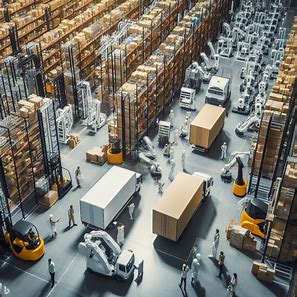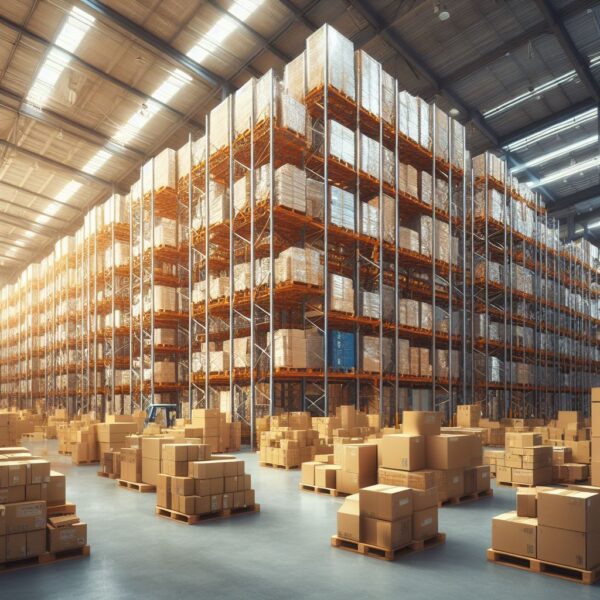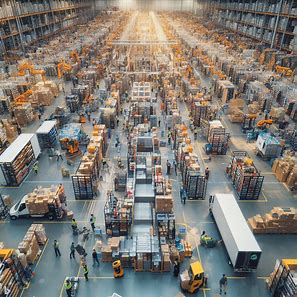Fulfillment Center vs. Warehouse: What are the Differences?
Table of Contents
Key Takeaways
Purpose: Warehouses are primarily used for long-term storage of goods, focusing on inventory management and safekeeping. Fulfillment centers, on the other hand, are geared towards processing and shipping orders quickly.
Operations: Warehouses often have minimal day-to-day operations, mainly storing products until they are needed. Fulfillment centers are bustling with activity, handling tasks like order processing, packing, and shipping in a timely manner.
Role in Supply Chain: A warehouse is a critical component of the supply chain for holding inventory, whereas a fulfillment center plays a vital role in the e-commerce ecosystem, ensuring products reach customers promptly.
Business Use: Warehouses are ideal for businesses that need to store large quantities of goods for extended periods. Fulfillment centers are more suited for businesses with high-order volumes requiring fast turnover, such as online retailers.
Customer Focus: Fulfillment centers are closely aligned with customer service, aiming to reduce delivery times and improve customer satisfaction. Warehouses do not directly interact with customers but play a key role in the broader supply chain efficiency.
- Freight Capacity Solutions provides access to a centralized freight marketplace with a large pool of carriers.
- Digital freight platforms like CoyoteGO enable shippers to connect with carriers, obtain instant quotes, track shipments, and automate settlement.
- Accessing a wide range of transportation modes and equipment types helps optimize your shipping strategy.
- Freight Capacity Solutions empowers businesses to make data-driven decisions and stay competitive.
- By leveraging dedicated freight specialists, businesses can enhance efficiency and drive growth.
Looking for a 3PL Company for your Amazon Product or Ecommerce Business?
What is a Fulfillment Center?

Choosing the right storage and distribution facility is a crucial decision for any business dealing with physical products. But the choice between a fulfillment center and a warehouse can be confusing. While they share some commonalities, there are also key differences you need to understand to make the right choice for your unique needs. This article will examine the differences and similarities between fulfillment centers and warehouses to help you make an informed decision.
An efficient storage and order fulfillment operation is vital for businesses selling physical goods. It ensures quick turnaround on orders and reliable delivery to delight customers. However, choosing the wrong facility can lead to higher costs, slower processing, and disappointed customers.
As a business owner, you may be debating whether you need a fulfillment center or a warehouse. The choice is not always straightforward. While both offer storage solutions, they have very different capabilities. You need to weigh factors like inventory storage duration, services required, costs, and more.
This article will provide a nuanced look at fulfillment centers and warehouses. We will compare their functionality, services, technology use, and more. By the end, you’ll have the knowledge to decide which option is better suited to help your business thrive.
A fulfillment center is a large facility specifically designed to store inventory for short periods and fulfill customer orders with speed, accuracy, and quality customer service. Their primary function is to provide end-to-end order processing services to businesses selling products online, through catalogs, brick-and-mortar shops, or direct sales channels.
Fulfillment centers are tailored for high-volume order processing. They utilize technology and workflows optimized to take an order from receipt to delivery with maximum efficiency.
Their infrastructure supports fluctuating order volumes from businesses with unpredictable or seasonal demand peaks. Flexible staffing, generous processing space, and advanced warehouse management systems (WMS) keep them nimble.
Services Offered
Fulfillment centers provide a wide array of services to support ecommerce and multichannel businesses. Their offerings include:
- Inventory management – They have trained staff and technology to receive large volumes of inventory, accurately track quantities, and report real-time stock level visibility. This helps businesses optimize inventory planning.
- Order processing – When an order is received, they swiftly pick, pack, and prepare the order for shipment. Accuracy checks are built into the process to avoid mistakes. The best centers offer same-day processing to keep customers happy.
- Packaging and shipping – They have all the materials and equipment to package orders for safe shipment. Integration with shipping couriers ensures quick delivery.
- Returns and refunds – They handle product returns end-to-end including inspections, initiating refunds, and managing reshipments. This takes the hassle away from sellers.
- Customer service – Many provide multilingual customer service teams to handle buyer inquiries and exception cases. This improves customer satisfaction and frees up seller resources.
Overall, their goal is to quickly progress orders from receipt to delivery while providing exceptional service quality. Top fulfillment centers become invaluable partners in helping online businesses scale efficiently.
What is a Warehouse?

In contrast to fulfillment centers, warehouses are facilities meant for long-term bulk storage of goods. Their primary role is providing cost-efficient storage space and limited handling of inventory.
Warehouses are designed for palletized storage and industrial material handling. They have large open spaces, wide aisles, high ceilings and bays for pallet racks. Forklifts are used to move heavy loads. While affordable, their layouts are not optimized for fast fulfillment activities.
They aim to maximize storage density and operate at lower costs than fulfillment centers. However, with limited processing capabilities, warehouses are not equipped for direct-to-consumer order fulfillment.
Warehouse Services Offered
Warehouses focus on a limited set of offerings:
- Bulk storage – Their layouts and material handling equipment allow high-density storage of palletized goods. This facilitates storing large volumes of inventory or raw materials long-term.
- Long-term storage solutions – Inventory can remain in warehouses for months or years until required downstream for manufacturing, transport or wholesale distribution.
- Limited value-added services – Basic services like labeling, light assembly or repackaging may be offered. But specialized fulfillment services are unavailable.
Their objective is optimized storage density and cost savings rather than order processing speed and flexibility. This makes warehouses unsuitable for most e-commerce order fulfillment which requires greater sophistication.
Key Differences

While both warehouses and fulfillment centers store inventory, they diverge sharply in their capabilities.
Functionality
- Fulfillment centers are highly customer-focused, aiming to quickly fulfill and ship high volumes of orders to end consumers. Warehouses simply focus on long-term bulk storage and wholesale distribution.
Order Processing Services
Fulfillment centers provide end-to-end order processing, customer service and shipping. Warehouses have minimal order fulfillment capabilities.
Technology Utilized
- Fulfillment centers utilize advanced Warehouse Management Systems (WMS), inventory tracking and order management software, along with automation. Warehouses employ only basic inventory management and material handling tech.
Throughput Capacity
- Fulfillment centers are designed to handle high volumes of orders per day and seasonal peaks. Warehouse throughput is lower.
Accuracy
Fulfillment centers achieve high fulfillment accuracy through technology assisted processes. Warehouse order accuracy tends to be lower.
Costs
Fulfillment centers cost markedly more than warehouses per square foot due to higher overheads. But warehouses cannot match their order processing capabilities.
Key Similarities

Despite the significant differences in their capabilities, warehouses and fulfillment centers also share a few commonalities.
Storage Capability
- Both offer storage solutions for physical products, although warehouses focus on high-density palletized storage.
Inventory Management
- They both provide inventory visibility and control to some degree, tracking goods entering and leaving the facility.
Storage Duration
- If you need long-term storage of 6 months or more, a warehouse may be the better choice. For inventory requiring fast turnover, a fulfillment center is preferable.
Order Processing Volumes
- High order volumes or peaks above 5,000 orders daily indicate a fulfillment center. Lower volumes may be viable in a warehouse.
Cost Analysis
- Compare costs against each option’s benefits. While fulfillment centers cost more, their services justify the price for many ecommerce sellers.
Tactical Logistic Solutions Warehousing
Tactical Logistic Solutions, a prominent 3PL company, adeptly bridges the gap between Warehousing & Distribution operations. Their warehouses offer secure, long-term storage solutions, essential for inventory management. In contrast, their fulfillment centers are geared towards rapid order processing and shipping, catering to the fast-paced demands of e-commerce businesses. This integration of services, including Domestic Trucking, Drayage Solutions, and Freight Forwarding, ensures a seamless supply chain management experience. By balancing the stability of warehousing with the dynamism of fulfillment centers, Tactical Logistic Solutions enhances efficiency and customer satisfaction in the logistics sector.
Conclusion
Fulfillment centers and warehouses cater to very different business needs. Evaluating your expected order volumes, peak seasons, preferred storage duration, and services required will clarify which choice offers the biggest payoff.
If nimble order processing is critical, the systems and capabilities of a fulfillment center are likely worth the higher costs. But if you just need simple storage, a warehouse may be the better option.
Carefully weighing all the factors outlined here will lead you to the ideal logistics solution for your e-commerce or omnichannel business.
Frequently Asked Questions
3PL (Third-Party Logistics) fulfillment refers to the use of a third-party business to outsource elements of a company’s distribution and fulfillment services. This type of service encompasses various logistics functions including storage, warehousing, and transportation services, as well as specific activities related to order fulfillment.
A fulfillment center is a facility specifically designed to store inventory short-term and rapidly fulfill orders for e-commerce or omnichannel businesses. They provide services like order processing, packaging, shipping, returns, and customer service.
A warehouse is designed for long-term, high-density storage of bulk inventory like pallets of raw materials or wholesale goods. They have limited order fulfillment capabilities.
Consider inventory volume, anticipated order processing volumes, preferred storage duration, variability in sales, services required, costs and more. Evaluating all these factors will make it clear whether a fulfillment center or warehouse matches your needs.
A WMS is software that handles key warehouse functions like inventory tracking, order processing, labor management, and more. Fulfillment centers use advanced WMS, while warehouses have basic systems.
1PL means managing logistics in-house. 2PL is using a company for specific services. 3PL is outsourcing fulfillment to a 3rd party. 4PL means outsourcing the management of your 3PL providers to another firm.
Contact Us
Still unsure of the best storage and fulfillment model for your business? Contact our logistics experts at Tactical Logistic Solutions for a free consultation tailored to your specific requirements.









